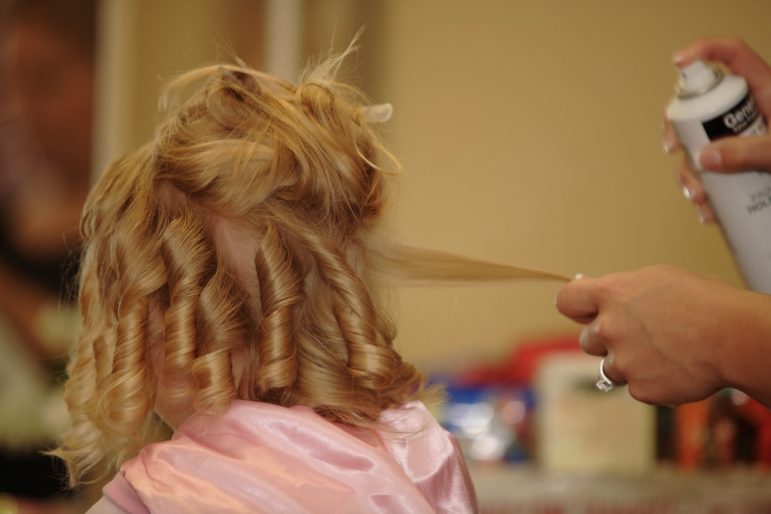“It’s probably because you’re a captive audience, when somebody’s working on your hair, you know, you’re there and comfortable and you can’t leave, you’re not going anywhere, so you’re pretty much a captive audience and it is just a comfort level of it just being a safe place.”
And the salon being a safe place to talk becomes quite apparent as Barnett starts to shampoo Douglas’s hair.
Douglas: “My brother who is just younger than I am, his house burned down ’bout, three or four, three weeks ago. Barnett: Is he here or in Utah? Douglas:: He’s in Utah. They had, they got a new dog, they got a labradoodle, and he jumped up on the cupboard and did something to the toaster.”
Barnett says the relationship between stylist and customer can be quite intimate. That intimacy is a big reason Barnett signed up for Cut It Out, a domestic violence intervention that trains stylists to pick up on signs of abuse.
“I can’t understand why we didn’t have this program sooner ’cause it is; it’s a very natural match. As cosmetologists we are friends, we’re family and, a lot of times, we’re the shoulder that people cry on.”
Cut It Out started five years ago after then state Attorney General Bill Pryor gave a half-million dollars to the Women’s Fund of Greater Birmingham to start a domestic violence program. Cut It Out co-founder, and Southern Living at Home Vice President, Dianne Mooney says the money gave them the start they needed.
“So we coalesced a group of community service providers and we said, ‘What’s not happening in the community?’ And they all said, ‘Go to the salon. That’s where people talk, that’s where people reveal their innermost secrets, very often what they wouldn’t say to friends or family.'”
One of those agencies saying “go to the salon” is the Alabama Coalition Against Domestic Violence. It’s housed in a cavernous two-story home in Montgomery and Carol Gunlach is its director.
“There are not very many places that victims are often allowed to go by their abuser without him going with them. The hair dresser, the gynecologist, the laundry mat, are often about the only places they go by themselves and because of that that’s a great avenue to get information out.”
Informal intervention programs like Cut It Out are especially important here in Alabama, where so much of the population is rural. Gunlach says there aren’t many places isolated domestic violence victims can go.
“Victims are very reluctant to come forward because they know it’s dangerous for them to come forward that, if the abuser says, ‘If you tell anybody I’ll kill you’, you know that may very well be true. And so it takes a great deal of courage for a victim to step out and ask for some help.
At Cut It Out’s website stylists are asked to pipe up if they’ve talked with a victim. But it’s not just stylists who are logging on. Victims themselves are sharing their stories at the site and organizers expect more to do so. After a national roll-out last year, there are now 20-thousand stylists taking part in Cut It Out in all fifty states.

